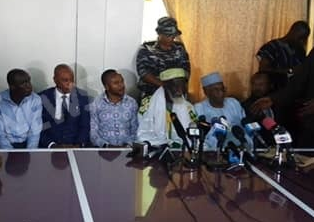
Three members of Sudan’s ruling military council resigned on Wednesday evening after it said it reached “agreement on most demands” with protest leaders who have called for a million-strong march to demand a civilian government.
The 10-member military council had invited the protest leaders for a meeting after the leaders suspended talks with the army rulers on Sunday.
“We have an agreement on most demands presented in the document of the Alliance for Freedom and Change,” Lt Gen Shamseddine Kabbashi, spokesman of the ruling military council, told reporters after the meeting between the council and leaders of the umbrella group leading the protest movement.
He did not elaborate on the key demand of handing power to a civilian government, but said there “were no big disputes”.
One of the protest leaders who attended the meeting, Ahmed Al Rabia, said the two sides had also agreed to form a joint committee, but did not elaborate for what.
Minutes later in a separate statement the military council announced that three members of the ruling body had resigned.
They were Lt Gen Omar Zain Al Abdin, Lt Gen Jalaluddin Al Sheikh and Lt Gen Al Tayieb Babikir.
Wednesday’s late-night developments came as Siddiq Farouk, one of the leaders of the protests, told reporters that the demonstrators were “preparing for a general strike” if the ruling military council refused to hand power to a civilian administration.
He also said that a “million-strong march” is planned, confirming a call for the mammoth protest on Thursday by the Sudanese Professionals Association (SPA), the group that initially launched protests against longtime leader Omar Al Bashir in December.
For the first time, Sudanese judges said they would join an ongoing sit-in outside army headquarters “to support change and for an independent judiciary”.
The demonstrations initially began in the central town of Atbara on December 19 against a decision by Mr Al Bashir’s government to triple bread prices.
They swiftly turned into nationwide rallies against his rule and that of the military council that took his place.
The council, led by Lt Gen Abdel Fattah Al Burhan since his predecessor quit after barely 24 hours in the post, says it has assumed power for a maximum two-year transitional period. However, he has said that the transition could be significantly shorter – even just a few months – if conditions allow.
Hundreds of protesters came from the central town of Madani to join the sit-in on Wednesday, the second major batch of new arrivals from outside the capital in as many days.
A train laden with demonstrators had rolled in from Atbara – the crucible of the protests – on Tuesday.
“Revolutionaries from Madani want civilian rule,” the latest arrivals chanted, according to witnesses.
The protesters suspended earlier talks with the council Sunday over its refusal to transfer power immediately.
But, the military council invited the protesters to fresh talks on Wednesday, acknowledging their role in “initiating the revolution and leading the movement in a peaceful way until the toppling of the regime” of Mr Al Bashir.

“We are ready to talk with the chief of the military council and I think the issue can be solved through dialogue,” he told reporters.
Thousands have camped outside the military headquarters in central Khartoum since before Mr Al Bashir was deposed, and have vowed not to leave the area until their demands have been met.
Late on Wednesday, crowds of protesters carrying Sudanese flags marched through the protest site outside the army headquarters.
“Fall or not, we are staying,” the protesters chanted.
Protester Ayman Ali Mohamed said he was planning to join Thursday’s march.
“We fear that the military council might steal our revolution, so we have to participate until the transfer to civilian rule is accomplished,” he said.
“We are standing our ground no matter what.”
The protesters have found support in Washington, which has backed their call for civilian rule.
“We support the legitimate demand of the people of Sudan for a civilian-led government, and we are here to urge and to encourage parties to work together to advance that agenda as soon as possible,” State Department official Makila James said on Tuesday.
Several African leaders, who had gathered in Cairo on Tuesday at the behest of Egyptian President Abdel Fattah El Sisi, insisted on “the need for more time” for a transition, according to Mr El Sisi’s office.
The leaders urged the African Union to extend by three months an end-of-April deadline for the council to hand power to a civilian body.
–



